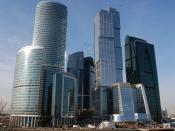Grenoble Graduate School of Business: International Marketing MBA AssignmentInternational Market Entry for the Mobile TelecommunicationsMarket in the Russian FederationPatrick PetitProgram Lecturer: Paul Gaffney professor at Grenoble GraduateSchool of Business and Oxford Brooks Business SchoolAbstractThis paper presents and analyzes of the findings from a research diary (provided in an appendix),which aims is to explore the market entry and development strategies for the mobiletelecommunication market in the Russian Federation. The research diary uses references fromrelevant academic sources, trade journals and online publications that are available in theReferences Cited section. The diary covers the experience of foreign firms doing business inRussia and how they see opportunities and risks in general terms in this country. Speaking of themobile telecommunications market is actually an umbrella term for several sub-markets (or sectors)including wireless-carriers and cellphone operators, cellphone retailers, cellphone manufacturers,consumer electronics, mobile network value-added services and software vendors, each being ofsignificant size. For the sake of keeping this study within a reasonable scope, the research diaryfocuses more on the mobile-phone (cellphone or handset) market in Russia from the perspective ofsome of the top five cellphone manufacturers including Nokia Corp, Samsung Electronics Co, LGElectronics Co, Sony Ericson, and Motorola Inc.
The main findings suggest that the cellphonemarket growth opportunity in Russia is not what it used to be since it has reached a saturation pointof over 100 percent, and that many analysts cast skepticism about the potential of newtechnologies, like 3G networks, to effectively maintain sales growth in a foreseeable future.
IntroductionWestern firms are attracted by the Russian market principally due to its large domestic market ofover 142 million consumers, its increasing political stability, with good recent macroeconomicindicators and promising growth prospects. In addition, Russia is a young and dynamic market(Smith, 2006) capable of rapid changes leading to risks as well as opportunities for new entrants.


